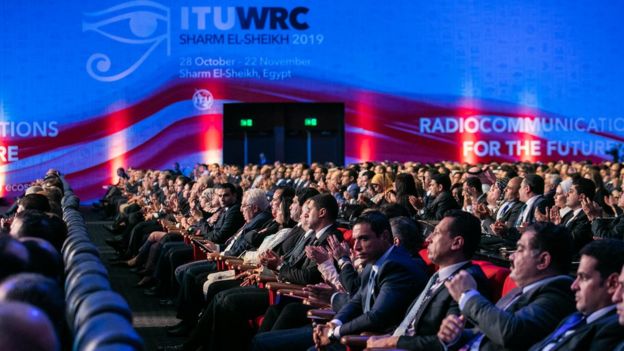A fight over access to radio-wave frequencies for 5G mobile data is coming to a head as officials decide how wavelengths should be allocated.
The European Space Agency has warned opening up the airwaves will harm climate change research and make weather forecasting more difficult.
But a mobile industry group says these claims are "unfounded" and will limit networks' ability to offer fast speeds.
Ministers and regulators are meeting in Egypt to discuss the options.
More capacity
The World Radiocommunication Conference 2019 (WRC-19) in Sharm el-Sheikh will attempt to find a global agreement on how 5G airwaves should be used.
Launched in the UK this year, 5G enables users to download films over the internet in seconds rather than minutes.
UK media watchdog Ofcom said on Monday it would auction more sub-6GHz (gigahertz) low- and mid-level airwaves next year to boost coverage and support the rollout of 5G services.
But higher-level "millimetre wave" (mmWave) frequencies offer the scope to provide further 5G capacity.
 More than 3,000 delegates are gathered at the WRC-19 conference in Egypt
More than 3,000 delegates are gathered at the WRC-19 conference in EgyptIn May, the European Union said some of these high-frequency airwaves should be released by member states before the end of 2020 to facilitate the 5G rollout.
Experts say these airwaves could help avoid the high-speed service being swamped by demand, thus ensuring the smooth running of data-hungry applications, including those that power autonomous vehicles and augmented reality apps.
However, meteorologists have warned if too much bandwidth is provided, it could cause interference with the equipment they use to predict hurricanes and other weather patterns. So, they want a narrower range of mmWave frequencies to be offered than mobile networks would like.
Fiona Vanier, a senior analyst at CCS Insight, said: "Meteorologists are concerned that radio frequencies such as 23.8GHz [at the beginning of the mmWave zone] contaminate Earth observations such as water-vapour detection."
Weather data
The European Space Agency (ESA) told BBC News it feared its ambitious Copernicus project could be compromised.

The Earth observation programme uses vast amounts of data to help study climate change.
The ESA said mobile networks' use of high-frequency 5G airwaves could also affect its ability to communicate with satellites, including those used to collect weather data.
"Those remote sensors constitute an essential part of the global numerical weather prediction and are key in the observation of the global climate," a spokesman said.
The GSM Association (GSMA) trade body said the WRC event, which is held every four years, was a "make or break moment" for 5G.
 5G mmWave is designed to drive the next generation of robots and AI
5G mmWave is designed to drive the next generation of robots and AIAnd its head of spectrum, Brett Tarnutzer, accused the ESA of "fear mongering".
"[Studies have] demonstrated that 5G using mmWave spectrum can co-exist safely and efficiently alongside weather-sensing services, commercial satellite services and others," he said.
"This protectionist attitude will have consequences for our global economy if allowed to prevail."
SOURCE: BBC

